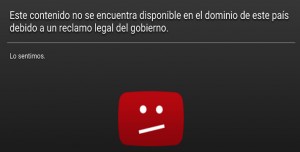EspañolFor months it was impossible to have a conversation in Buenos Aires without the subject of 12-year-old Juan Sánchez popping up. In 2014, Juan was the star of one of those feel-good stories that TV news programs like to do during the winter holidays.
Over a year later, his peculiar voice — speaking more like an adult than a kid — unwittingly turned him into a national celebrity. The video and its dozens of parodies have amassed more than 5 million views on YouTube. But instead of just living out his remaining 15 minutes of fame, Juan is now poised to set a very dangerous precedent.
In response to a request from Sánchez’s family, the Buenos Aires Ombudsman’s Office asked YouTube to pull down all videos related to Juan’s interview. The video-platform site promptly complied, and hours later, it removed any sign the video had every existed for Argentinean audiences.
“This content is not available in your country due to a government removal request,” read YouTube’s message on computer screens across the South American nation.
According to the Ombudsman’s Office, the video affects Juan’s “intimacy, dignity, and honor, and has led to systematic abuse on social media.”
“The young man has for months suffered bullying on social media … leading hundreds to ridicule him in videos, images, graffiti, and even selling merchandise with his image,” a press statement from the Ombudsman’s Office noted.
The authorities argued that “even though the harm has already been inflicted and the teen’s suffering cannot be undone,” the way the internet continued to ridicule Juan was having “a profound impact on a social and personal level.”
The Right to Force Everyone to Forget
Removing a video from the internet to protect someone’s reputation stems from the so-called right to be forgotten: the idea that we can ask search engines like Google not to include results that contain sensitive information about us that we’d rather have people not see.
In reality, however, this supposed right is a way to try and force everyone else to forget about something. Erasing the past, just like in Orwell’s 1984.
It treats things like reputation and image as if people have any ownership over them. As counterintuitive as it may sound, an individual is not the owner of his own honor, image, or reputation; they are abstract concepts that others make of him.
If my reputation is not mine, but rather the sum of what other people think of me, then how can I have any right to it? It’s inevitably beyond my control.

The truth is we are constantly building other people’s reputations and images in our minds. While many of us may not care what someone else may think of us, the problems typically begin when this person decides to air out some negative opinion publicly, especially online.
The Ombudsman’s Office is partially wrong in claiming that the “way the internet depicts this child” has harmed him. There was no hidden camera, and this wasn’t some sort of smear campaign. It was simply Juan being Juan. Some argument could be made for the potential harm caused by the various parodies and memes, but certainly not the initial video itself.
[adrotate group=”8″]
In order to fully uphold this so-called right to be forgotten, the government would need to severely restrict free speech, since reputation is based on public opinion. Any legislation aimed at enforcing this “right” would seek to keep millions of people from knowing or easily accessing parts of history based on the desires of an individual who wants that information gone.
In this case, Juan’s parents should have taken better care of him and better prepared him for his interview. It’s true that no one could have anticipated that his interview would go viral, but sometimes life gives you lemons. In the end, things went well for Juan. He had the chance to meet one of his idols, the famous cartoonist Liniers. Even though there was some inexplicable hate directed at Juan online, many others who watched the video commented on how polite and educated he seemed.
According to their policy statement, Google says it removes “improper, irrelevant, no longer relevant, or excessive” content. Again, we face the same problem: what might be irrelevant for some could be important for others. When evaluating a potential employee, a business associate, a political candidate, or the family doctor, search engines are useful tools to help us create a better first impression and vet them.
Lacuna Inc., the fictional company featured in the 2004 film Eternal Sunshine of the Spotless Mind that wipes people’s memories, is not yet a reality. If lawmakers are so fond of creating new legislation to protect people from life itself, maybe they’ll soon pass a law to force everyone to think twice before they act, so they don’t later regret what they’ve done.
 Versión Español
Versión Español












